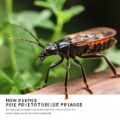IKEA’s Bold Vision for a Sustainable Food Future
Swedish furniture giant IKEA is setting its sights on revolutionizing not just our homes, but our plates as well. In a groundbreaking move towards sustainability, IKEA is exploring the integration of spirulina and edible insects into its food offerings. This initiative represents a compassionate approach to addressing global food security and environmental challenges, while also promoting health and wellbeing.
As we face growing concerns about climate change and food scarcity, IKEA’s innovative direction offers a beacon of hope. By embracing alternative protein sources like spirulina and insects, the company is paving the way for a more sustainable and nutritious food system that could benefit both people and planet.
The Power of Spirulina: A Superfood for the Future
Spirulina, a type of blue-green algae, is emerging as a powerhouse in the world of nutrition. Rich in protein, vitamins, and minerals, this microscopic plant has the potential to address malnutrition on a global scale. IKEA’s interest in spirulina stems from its impressive nutritional profile and minimal environmental impact.
- High in protein (up to 70% by dry weight)
- Contains essential amino acids
- Rich in vitamins B1, B2, and B3
- Excellent source of iron and antioxidants
- Requires minimal water and land to produce
By incorporating spirulina into its food products, IKEA is not only offering customers a nutrient-dense option but also promoting a food source that could play a crucial role in feeding a growing global population sustainably.
Edible Insects: A Sustainable Protein Alternative
While the idea of eating insects may seem unusual to some, entomophagy (the practice of eating insects) has been part of human diets for thousands of years. IKEA’s exploration of edible insects as a food source is rooted in both tradition and innovation, recognizing the potential of insects to provide high-quality protein with a significantly lower environmental footprint compared to conventional livestock.
Some benefits of edible insects include:
- High protein content
- Rich in essential nutrients like iron and zinc
- Require less water and feed than traditional livestock
- Produce fewer greenhouse gas emissions
- Can be raised on organic waste, promoting circular economy principles
By introducing insect-based foods, IKEA is not only offering a sustainable protein alternative but also encouraging customers to broaden their culinary horizons and consider the global impact of their food choices.
IKEA’s Commitment to Sustainability and Wellbeing
IKEA’s venture into spirulina and edible insects is part of a broader commitment to sustainability and human wellbeing. The company recognizes that our food choices have far-reaching consequences for both personal health and the health of our planet. By offering these innovative food options, IKEA is empowering consumers to make choices that align with their values and contribute to a more sustainable future.
This initiative also reflects IKEA’s dedication to:
- Reducing carbon footprint across its operations
- Promoting circular economy principles
- Supporting biodiversity and ecosystem health
- Encouraging healthier eating habits among customers
- Fostering innovation in sustainable food production
Overcoming Challenges and Changing Perceptions
While the potential benefits of spirulina and edible insects are clear, IKEA faces the challenge of changing consumer perceptions and habits. Many people, particularly in Western cultures, may be hesitant to try foods that seem unfamiliar or unconventional. However, IKEA’s approach is not about forcing change, but rather about offering choices and educating consumers about the benefits of these sustainable food options.
To address these challenges, IKEA is likely to:
- Provide clear information about the nutritional and environmental benefits
- Offer tastings and demonstrations to familiarize customers with new products
- Develop recipes that incorporate these ingredients in familiar and appealing ways
- Collaborate with chefs and nutritionists to create delicious and healthy options
- Engage in community outreach and education programs
By taking a compassionate and educational approach, IKEA can help shift perceptions and open minds to these sustainable food alternatives.
FAQ: IKEA’s Sustainable Food Initiative
Q1: Why is IKEA exploring spirulina and edible insects as food options?
A1: IKEA is committed to sustainability and recognizes the potential of spirulina and edible insects to provide nutritious, environmentally-friendly protein sources that could help address global food security challenges.
Q2: Are spirulina and edible insects safe to eat?
A2: Yes, when properly sourced and prepared, both spirulina and edible insects are safe for human consumption. They have been eaten by various cultures for centuries and are gaining recognition as nutritious food sources globally.
Q3: How will IKEA incorporate these ingredients into its food offerings?
A3: While specific details are yet to be announced, IKEA may introduce these ingredients in various forms, such as protein bars, snacks, or as ingredients in prepared meals at their in-store restaurants.
Q4: Will these new food options be available worldwide?
A4: IKEA will likely introduce these options gradually, starting in markets where there is more openness to such foods. The availability may vary depending on local regulations and consumer acceptance.
Q5: How can consumers learn more about the benefits of spirulina and edible insects?
A5: IKEA is expected to provide educational materials in-store and online about these ingredients. Consumers can also research reputable scientific sources and health organizations for more information on the nutritional and environmental benefits of these foods.
Embracing a Sustainable Food Future with IKEA
IKEA’s exploration of spirulina and edible insects as sustainable food sources marks an exciting step towards a more environmentally conscious and nutritionally rich future. By offering these innovative options, IKEA is not just selling food; it’s inviting customers to be part of a global movement towards more sustainable living.
As we face the challenges of feeding a growing population in a changing climate, initiatives like this one from IKEA offer hope and practical solutions. They remind us that our everyday choices, even in something as simple as what we eat, can contribute to a better world for all.
Whether you’re ready to try a spirulina smoothie or curious about insect-based protein bars, IKEA’s sustainable food future offers something for everyone. It’s an opportunity to nourish our bodies, care for our planet, and open our minds to new possibilities in food and sustainability. As IKEA leads the way, we’re all invited to be part of this compassionate and innovative journey towards a healthier, more sustainable world.









